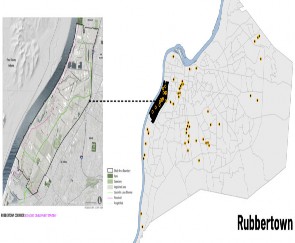

Learning Target - students will write a persuasive writing piece about a social injustice, like higher rates of health problems of citizen’s living in Louisville’s West End. A social injustice is a situation when some unfair practices are being carried in the society. Whatever unjust is happening is usually against the law and it might not be something that is considered a moral practice. The student must research a social injustice and state the facts about it and if anything is being done to change it. If nothing is being done to change it, then why?
Students will find a social injustice that used Science, Chemistry, or Physics to prove the problem was immoral or wrong and should be corrected. The writer should provide different options that are better than the current method producing the social injustice. Moreover, make case that the issue has been solved or still needs

fixing. If the case has been solved, the article would be addressing the money spent. Overspending on a problem can lead to other problems. Students do their best writing when they are interested in the topic. Students should understand that just because they address the topic once in a persuasive writing piece and it is published in the news does not mean the problem will be fixed. Often the problem will require multiple articles to show the problem's importance at being fixed and not overlooked.
Examples:
Flint, Michigan: Like dumping hazardous chemicals in wastewater like lead that can make its way back to drinking water like the following: https://www.nrdc.org/stories/flint-water-crisis-everything-you-need-know
Louisville, Kentucky:
Rubbertown is host to 11 large chemical plants, the largest source of industrial emissions in the Jefferson County area. The Rubbertown area accounts for 42% of air emissions in Jefferson County.[1]
Since the area is a potential health issue to residents, in recent years it has come under attack by various organizations in the community. As a result of increasing pollution the Rubbertown Emergency Action (REACT) group was established in April 2003 as a campaign of the Justice Resource Center. The group consists of Rubbertown residents who believe that clean air is a human right and use legislative, judicial and political action to improve air conditions. REACT became an independent grassroots organization later that year. REACT is fighting for:
Strong laws to stop toxic air pollution from chemical plants;
The protection of residents in the event of a leak, fire or explosion in a chemical plant or railcar;
Full disclosure and easy access to information concerning the impact of Rubbertown industry emissions on residents living nearby.
For many years, residents of western Louisville and nearby areas in Jefferson County had complained of health problems they attributed to air pollutant emissions from the many industrial facilities in Rubbertown. Citizen organizations such as ReACT (Rubbertown Emergency Action) have formed to advocate for more assessment and control of air emissions. The West Jefferson County Community Task Force (WJCCTF) was established by the Louisville

Metro Department of Public Health & Wellness (then the Jefferson County Department of Health) to identify problems in the area. https://wfpl.org/unequal- how-west-louisville-residents-cleaned- up-the-air/
Persuasive – Writing that states the opinion of the writer and attempts to influence the reader.
Persuasive writing is a form of nonfiction this means it is truthful writing that encourages careful word choice, the development of logical arguments, and a cohesive summary. Young children can be guided through a series of simple steps in an effort to develop their persuasive writing skills.
Persuasive writing intends to convince readers to believe in an idea or opinion and to do an action. Many writings such as criticisms, reviews, reaction papers, editorials, proposals, advertisements, and brochures use different ways of persuasion to influence readers.
Most Science is a form of persuasive writing and the following will help you organize your research:
When you read an article, it’s important to clarify the issue being debated. When you’re identifying the issue, phrasing something as a question can often help clearly state what is being argued over.
Should teens have the right to private medical appointments?
Should euthanasia be legalized?
Should fox poisoning be banned?
Should heroin be decriminalized? IDENTIFYING THE CONTENTION
Contention is simply another word for point-of-view or opinion. Read the piece of persuasive writing carefully. What does the writer believe? Starting a sentence with the word ‘that’ can help you identify the writer’s contention.
That reality television is a waste of time.
That teens should have access to private medical appointments
Tone refers to the overall feeling of a piece of writing. Here are some useful words to help you describe tone.
Writers can use a range of techniques to persuade. When you’re reading persuasive writing—or
writing persuasively yourself—you need to think carefully about how techniques like these are used to position the reader to accept a particular point of view.
e.g. “Reality shows allow us to feel a bland, artificial version of that incredible thrill you get from having a crack and chasing your ambitions.”
e.g. “In a recent article, I wrote about my dogs, a kelpie and a blue heeler, dying from 1080 fox bait. They had eaten it during a weekend trip to the high country and died horribly.”
e.g. ”And I can tell you it is distressing beyond words to watch an animal suffer like that and not be able to alleviate its agony.”
e.g. “For my three most recent books, on motherhood, cancer and nursing, I interviewed more than 300 people about the nuts and bolts of what our incredibly short time on this planet is really about – life, death, family and love. If there is one thing I can guarantee, it’s that there will never be a person who lies on their deathbed, shaking with rage, sobbing, ‘Dear God, I wish I’d spent more time watching MasterChef.'”
e.g. “Fairness is the cornerstone of our constitution and our national identity. But as we head into an election year, I think we need to ask ourselves whether we really believe in a fair go for all.” Cliches. An overused expression. Although they should be avoided, cliches give writers an opportunity to express an idea to their readers quickly.
Here are some examples of cliches:
Absence makes the heart grow fonder.
Alls well that ends well.
As light as a feather.
Time will tell.
e.g. “But no, people from the bush were saying it is cruel to kill foxes with a poison that causes a slow, agonising death.”
e.g. “Our experts will tell you a million reasons why it can’t or shouldn’t be done here. They have turned excuse-making into an art form.”
e.g. “According to the Australian Bureau of Statistics, males are 400 per cent more likely to commit an offence intended to cause injury than are females.”
e.g. “A new research report by Victorian doctors illustrates why: because when kids are worried their parents will be told their private medical details, they simply don’t go to the doctor.”
e.g. “We might not like it, but our kids’ right to confidential medical advice should take precedence over our right to know about it.”
e.g. “I’ve been dying of it all week and can hardly type this column because of the Niagra of snot pouring down my face and the painful fires of a thousand suns burning in my joints and muscles, which being manly muscles are able to carry a much heavier load of pain than lady muscles.”
e.g. “It’s been a trying year for rugby league, what with betting scandals, controversies over players’ alleged off-field behaviour and an unseemly on-field brawl that marred the sport’s reputation on approach to the finals.”
e.g. “Racism is no black and white issue”.
e.g “It has been well established here and overseas that if teenagers think they can see a doctor in confidence, they are more likely to do so, more likely to go back for repeat visits, and more likely to disclose sensitive information.”
e.g. “It has been well established here and overseas that if teenagers think they can see a doctor in confidence, they are more likely to do so, more likely to go back for repeat visits, and more likely to disclose sensitive information. And isn’t this the outcome we want? “
e.g. “Not all of us can write Max Walker’s How to Hypnotise Chooks, you know – for many years the biggest-selling title in Australian literary history.”
e.g. “…as dumb as a sack of hammers…”
THINKING ABOUT PERSUASIVE LANGUAGE
The best way to understand how persuasive language can be used to convey a point of view is by reading examples of persuasive writing. Read the newspaper on a daily basis, particularly the editorials and opinion pages. This will not only help you keep abreast of current events, it will also help you develop the language skills necessary to do persuasive writing yourself.
Before you get started, you need read the text carefully and annotate it, identify:
issue
contention
tone
audience
arguments
language
persuasive devices
![]()
Taking time to think about the prompt and to plan your writing will improve the quality of your final essay. Planning can help you compose a more organized, polished response. Use this guide to plan your composition.
Read the prompt carefully and restate it in your own words. Think specifically about what the prompt is asking you to do (for example, make an argument, tell a story, or explain a
process).
![]()
![]()
![]()
![]()
After you have thought about the prompt and it is clear what you’re being asked to do, write one or two sentences describing your initial reaction to the prompt. This may be the basis for your thesis statement, or the main idea of your essay.
![]()
![]()
![]()
![]()
Read the reminder list (questions to ask about the prompt) that follows the prompt. (If you are still unclear about the prompt, the list may help you better understand it.) Think about those items that you have particular trouble with and write them down. Explain how to avoid those mistakes in your writing.
![]()
![]()
![]()
![]()
Brainstorm ideas, details, or information to support your response to the prompt. You may use a brainstorming technique such as free writing, making a list, or creating a web. Record anything that comes to
mind.
![]()
![]()
![]()
![]()
Review the things you wrote as you brainstormed. What ideas support your thesis statement?
What details add information to those supporting ideas? Underline or highlight the ideas and details you plan to use in your composition.
![]()
![]()
![]()
![]()
![]()
There are many ways to organize your ideas. You may wish to use a visual representation such as a web, an outline, or a chart. The graphic organizers that follow are some examples of ways to structure your ideas.
![]()
![]()
![]()
![]()
This organizer is useful for many types of writing, including expository and persuasive essays. Use the thesis statement from the Respond exercise and the ideas from the Record and Review exercises to complete the graphic organizer. You may add additional Supporting Ideas and Details as necessary.
Detail: Detail: Detail:
Detail:
Detail:
Detail:
Detail:
Detail:
Detail:
Concluding Paragraph/Restatement of Thesis: submit to https://turnitin.com/t_home.asp?lang=en_us#
The subject matter I chose is appropriate for the prompt.
The details I include are clearly related to the subject matter. Picture of student
associated with the topic.
I include enough details to support my main idea. Picture of topic. Use pixlr.com to alter the picture 30%.
My composition has a strong beginning, a well-developed middle, and an effective ending.
My essay follows a clear, logical progression.
I establish relationships between ideas in my composition.
I use transitional words and phrases, parallel structure, and other techniques to connect
sentences and paragraphs.
I use effective sentence structure and word choice. Write in complete sentences.
Write coherent and well-developed paragraphs.
Use correct grammar, spelling, punctuation, and capitalization.